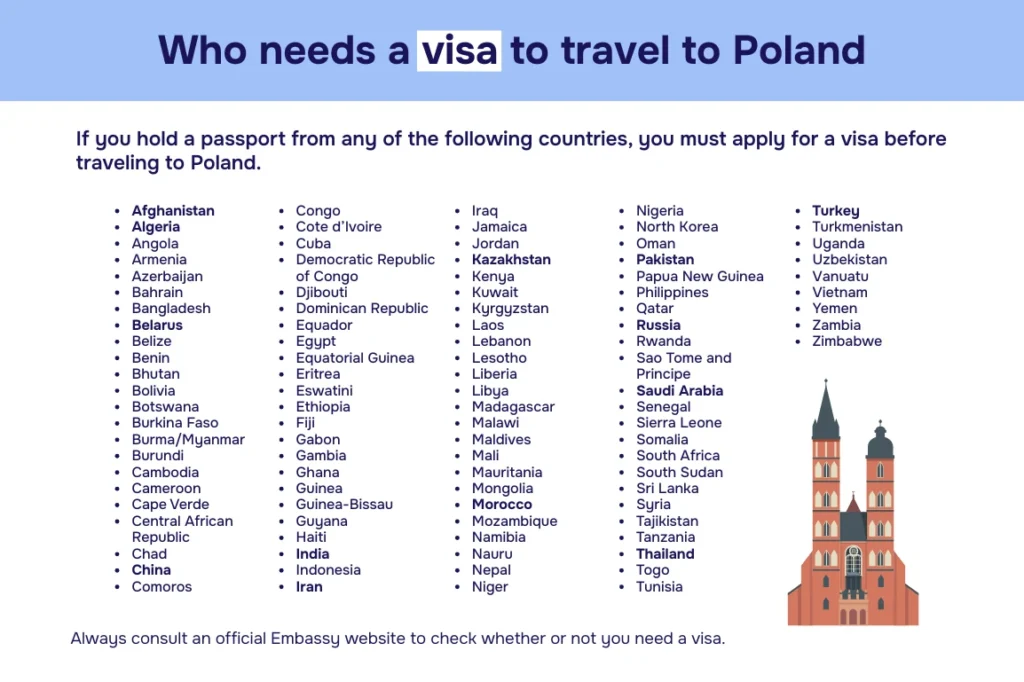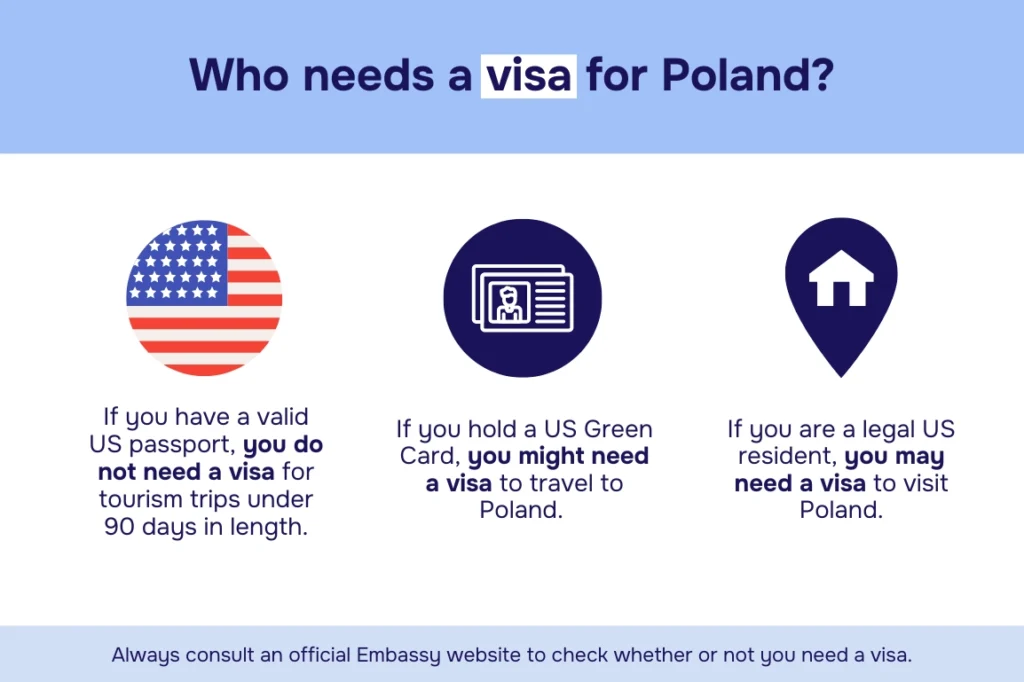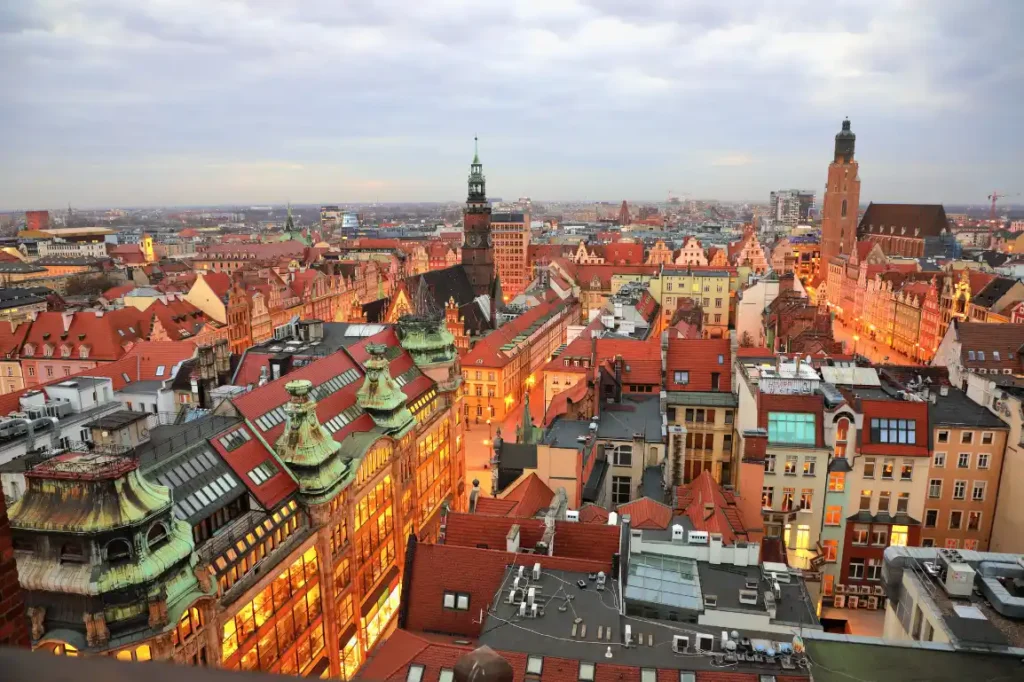Home > Poland Visa Guide: Everything You Need to Know

Poland Visa Guide: Everything You Need to Know
Poland is a beautiful country and a popular destination for travelers from all around the world.
Whether you're planning to visit Poland for tourism, work, study, or family reunification, understanding the necessary visa requirements is essential.
In this guide, we will dive into the details of whether or not you need a Poland visa, how to apply for one, and what to expect during the process.

Do I need a visa to go to Poland?
Whether or not you need a visa to travel to Poland depends on a few factors, including your nationality, the reason for your stay, and the duration of your trip
If you’re a citizen of a visa-exempt country (US, UK, Australia, Canada, others), you do not need a visa to visit Poland, as long as your trip is under 90 days and you aren’t traveling to work or study.
If you’re not a citizen of a visa exempt country (India, China, Russia, others) you need a visa in order to travel to Poland, regardless of the length or purpose of your stay.
For citizens of visa-exempt countries: you will need a visa if you plan on staying in Poland (or the Schengen area in general) for more than 90 days, or if your reason for traveling is to work in Poland or study.

Do US citizens need a visa for Poland?
No, US citizens can visit Poland for up to 90 days without a visa for tourism, business, or family visits, thanks to Poland being a Schengen country. However, longer stays or purposes such as work or study do require a visa.
How to apply for a visa for Poland
If you do need a visa to go to Poland, the process involves gathering the required documents, filling out a visa application, and scheduling an appointment at a visa application center or consulate.
The steps are typically as follows:
- Decide which Poland visa you need.
- Gather all of the necessary documents for your application.
- Book an appointment at a Polish consulate, visa center, or embassy in your home country.
- Attend your appointment (make sure to bring all of your documents!).
- Submit your application and biometrics during your appointment.
- Receive an answer!

Can I apply for a Poland visa online?
No, you need to apply in person at a visa center or consulate. However, the initial application form is often completed online before submitting your documents during your in-person appointment.
In the coming years, you will be able to apply for Poland visas online! The European Union is currently working on a new visa application system called EU VAP.
This platform will allow you to submit your application and pay the necessary fees online. You will still have to attend an appointment for a biometric collection. This platform is expected to be fully operational by 2030.
Is a Poland visa difficult to get?
Getting a visa for Poland is typically straightforward. However, complications can arise if your paperwork is incomplete or inaccurate. Whether or not your visa will be approved is entirely up to the Polish Embassy.
What is the rejection rate for Polish visas?
In 2024, the rejection rate for Polish visas was 17.2%. Rejections often occur due to missing documents or failure to meet the minimum requirements.
It can be helpful to understand that rejection rates are constantly changing and vary based on a variety of factors such as nationality, type of visa, and seasonality.

What is the processing time for a Poland visa?
The average processing time for Polish visas is around 15 days. However, it could be longer depending on your case and the type of visa you are applying for. Just because the processing time is usually relatively short, it doesn’t mean the entire process will be.
Application appointments book out very quickly, and sometimes it can take weeks or even months to get a slot. That’s why beginning the process far in advance is a must.
Poland visa application requirements
Visa requirements depend mainly on the purpose of your visit, though there is a list of essential, standard documents that you can expect to need, no matter the specific type of visa you’re applying for.
Which documents are required when applying for a visa for Poland?
- A completed Schengen visa application form (this can be found online)
- A valid passport
- Proof of accommodation and flights (including return flight)
- Travel insurance that meets Schengen visa travel insurance requirements
- Financial means to support yourself during your stay (bank statements)
- A recent photo (passport-sized)
- Biometric submission (fingerprints that will be collected at your visa appointment).
Polish visa costs
Schengen visas cost 90 euros per adult, 45 euros per child (ages 6-12), and are free for children under the age of 6. With that being said, some specific types of Poland visas may vary in cost.
Keep in mind that a Poland visa application fee is non-refundable, even in the event of rejection.
Your Polish visa appointment
All Polish visa applicants must attend an in-person appointment. This appointment will take place at an embassy, consulate, or visa center in your country of residence.
At your appointment, an authorized attendant will review your documents and application with you to check that everything is ready for submission. They’ll also assist you in biometric collection (fingerprints).
At this appointment, the attendant may ask you questions directly related to your provided documents and travel plans, but there aren’t specific questions that you need to practice for ahead of time.

Do I need to apply for ETIAS if I have a Poland visa?
No, if you hold a valid Poland/Schengen visa, you do not need to apply for ETIAS. ETIAS simply permits you to travel to the Schengen area, but your Polish visa does the same thing. If you are a citizen of a Schengen country, you will not need ETIAS to travel to Poland.
Who needs ETIAS to visit Poland?
From 2026, citizens from visa-exempt countries, like the US, Canada, and Australia, need ETIAS authorization to travel to Poland for short stays, if they do not have a visa.
Heading to Poland, but don't need a visa? Read more about ETIAS in our Poland ETIAS Guide.
FAQs about Polish visas
Guides you might be interested in
Are you going to France? Getting a visa for France
Planning a trip to Italy? Learn about Italian visas
Germany on the horizon? You may need a German visa
Heading to the Netherlands? Learn about Dutch visas
Going to Spain? Do I need a visa to go to Spain
Are you going to Greece? Check if you need a Greek visa
Want to go to Malta? Getting a visa for Malta
Planning a trip to Iceland? Check out the Iceland visa guide
Are you going to the Czech Republic? Read about Czech visas here
Trip to Austria coming up? Read our Austria visa guide
Planning to go to Switzerland? Read about Swiss visas
Going to Hungary? Read about Hungarian visas
Trip to Luxembourg coming up? Read about Luxembourg visas
Are you going to Norway? Read the Norway visa guide
Planning a trip to Croatia? Learn about Croatia visa requirements
Going to Denmark? Read our Denmark visa guide
Going to Bulgaria? You might need a Bulgarian visa
Planning a trip to Liechtenstein? See Liechtenstein visa information
Are you traveling to Sweden? Learn about Swedish visas
Off to Portugal? Read the Portugal visa guide
Estonia on the horizon? Learn about Estonian visas
Eager to travel to Romania? Getting a visa for Romania
Going to Finland? You may need a Finnish visa
Planning a trip to Slovakia? You may need a Slovakian visa
Are you going to Latvia? You may need a Latvian visa
Going to Lithuania? Learn about Lithuanian visas
